BM565 Digital Technology and Business: Mobile Technology Report
VerifiedAdded on 2023/06/11
|9
|2708
|259
Report
AI Summary
This report explores the significance of mobile technology in modern business, detailing its development, uses, and integration across various sectors. It highlights the importance of mobile technology in facilitating communication, online marketing, and digital payments, transforming business and customer models. The report discusses available technological platforms, including smartphones, tablets, and IoT devices, and their effectiveness as business tools. Furthermore, it examines the relationship between management theories and digital technology, emphasizing how mobile technology has reshaped business practices and the need for evolving management models to incorporate digital advancements. The report concludes that mobile technology is an essential component of business, driving innovation and requiring businesses to adapt to new digital landscapes. Desklib offers this report as a resource for students studying digital technology and business, providing access to similar solved assignments and past papers.
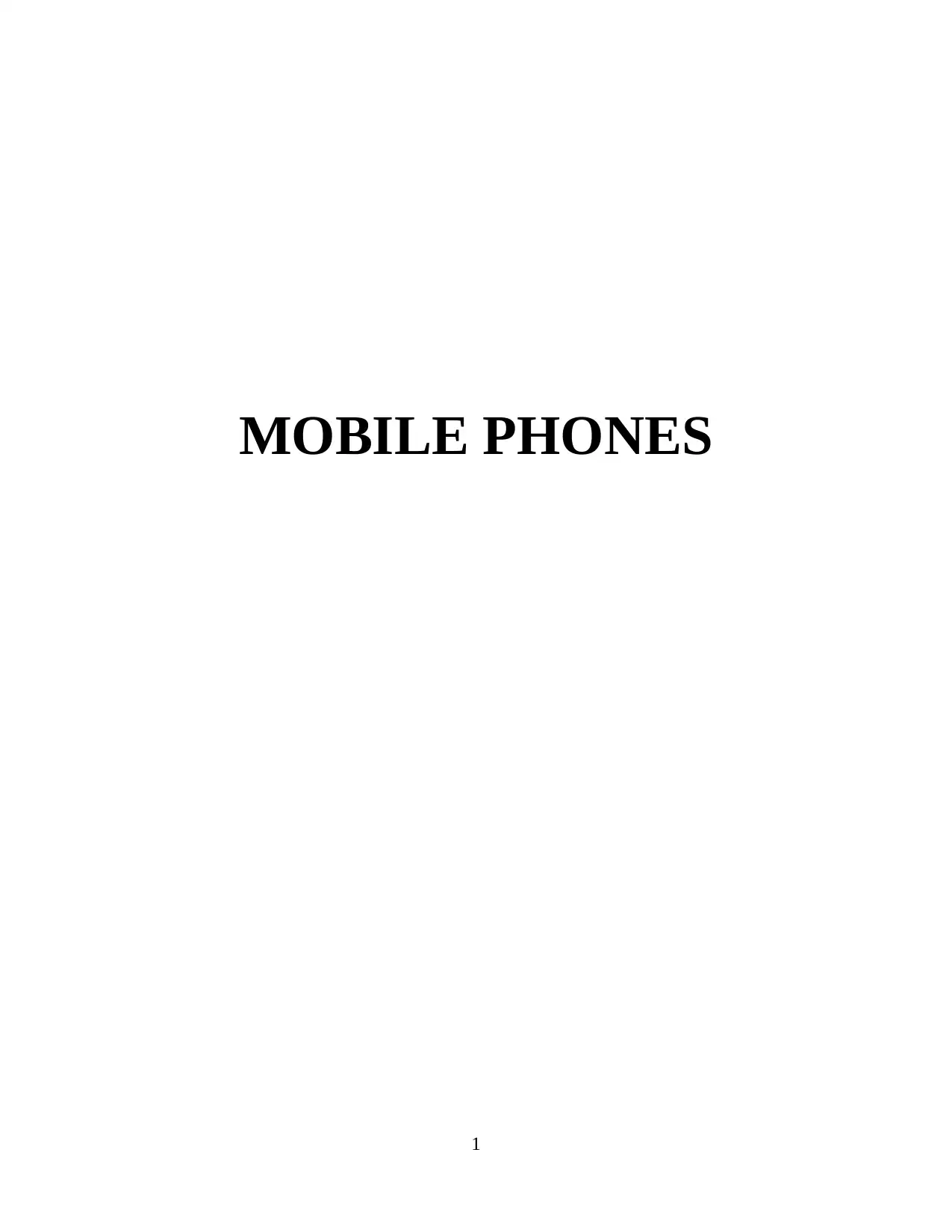
MOBILE PHONES
1
1
Paraphrase This Document
Need a fresh take? Get an instant paraphrase of this document with our AI Paraphraser
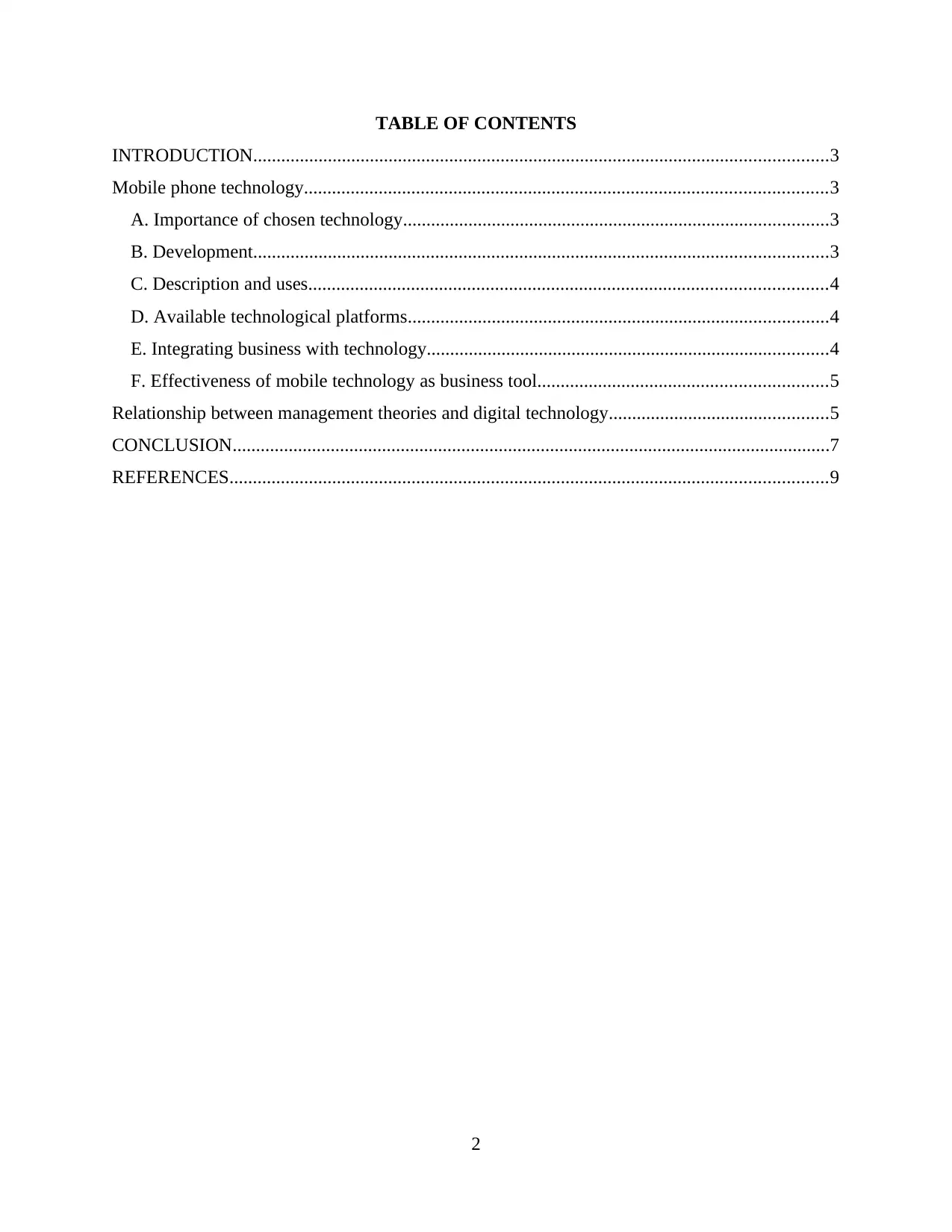
TABLE OF CONTENTS
INTRODUCTION...........................................................................................................................3
Mobile phone technology................................................................................................................3
A. Importance of chosen technology...........................................................................................3
B. Development...........................................................................................................................3
C. Description and uses...............................................................................................................4
D. Available technological platforms..........................................................................................4
E. Integrating business with technology......................................................................................4
F. Effectiveness of mobile technology as business tool..............................................................5
Relationship between management theories and digital technology...............................................5
CONCLUSION................................................................................................................................7
REFERENCES................................................................................................................................9
2
INTRODUCTION...........................................................................................................................3
Mobile phone technology................................................................................................................3
A. Importance of chosen technology...........................................................................................3
B. Development...........................................................................................................................3
C. Description and uses...............................................................................................................4
D. Available technological platforms..........................................................................................4
E. Integrating business with technology......................................................................................4
F. Effectiveness of mobile technology as business tool..............................................................5
Relationship between management theories and digital technology...............................................5
CONCLUSION................................................................................................................................7
REFERENCES................................................................................................................................9
2
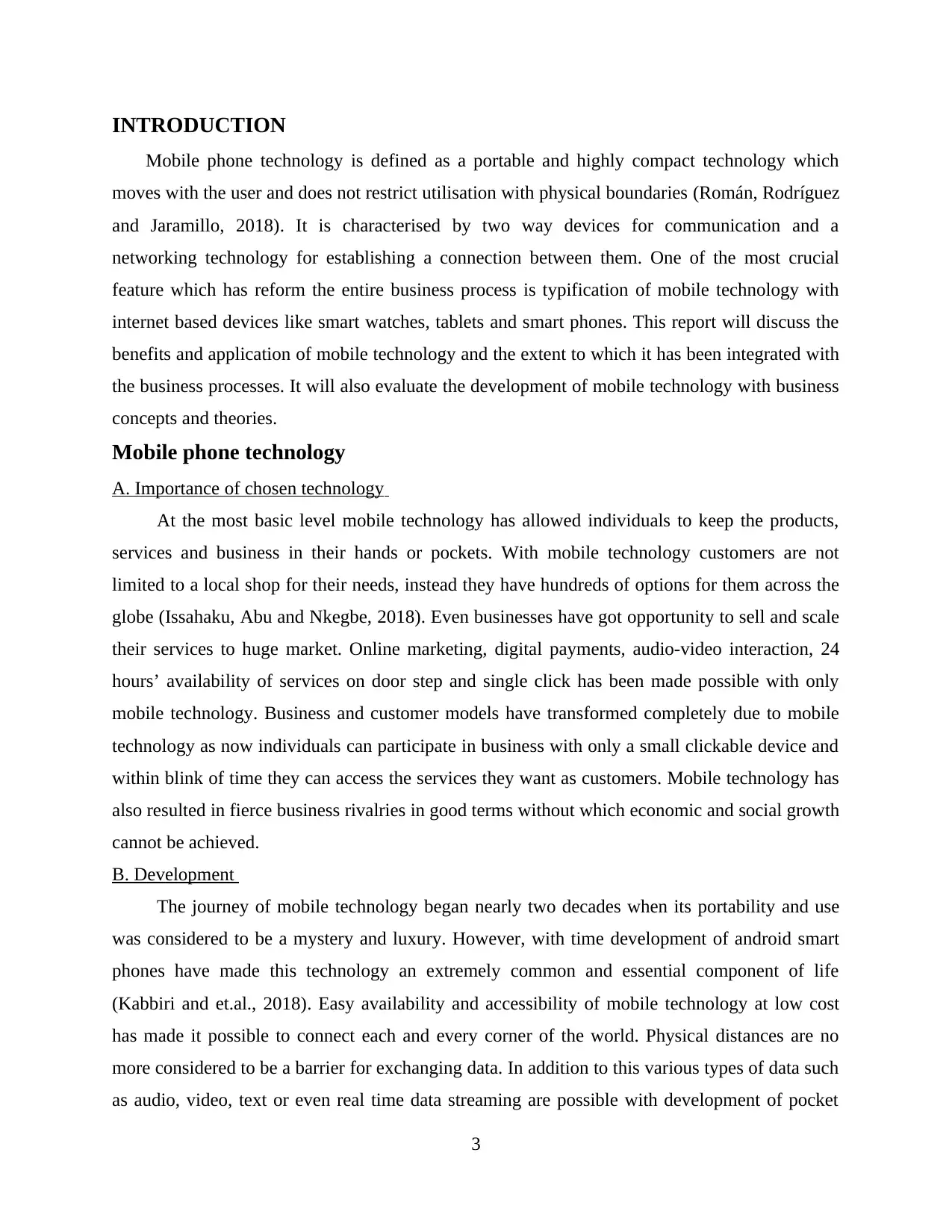
INTRODUCTION
Mobile phone technology is defined as a portable and highly compact technology which
moves with the user and does not restrict utilisation with physical boundaries (Román, Rodríguez
and Jaramillo, 2018). It is characterised by two way devices for communication and a
networking technology for establishing a connection between them. One of the most crucial
feature which has reform the entire business process is typification of mobile technology with
internet based devices like smart watches, tablets and smart phones. This report will discuss the
benefits and application of mobile technology and the extent to which it has been integrated with
the business processes. It will also evaluate the development of mobile technology with business
concepts and theories.
Mobile phone technology
A. Importance of chosen technology
At the most basic level mobile technology has allowed individuals to keep the products,
services and business in their hands or pockets. With mobile technology customers are not
limited to a local shop for their needs, instead they have hundreds of options for them across the
globe (Issahaku, Abu and Nkegbe, 2018). Even businesses have got opportunity to sell and scale
their services to huge market. Online marketing, digital payments, audio-video interaction, 24
hours’ availability of services on door step and single click has been made possible with only
mobile technology. Business and customer models have transformed completely due to mobile
technology as now individuals can participate in business with only a small clickable device and
within blink of time they can access the services they want as customers. Mobile technology has
also resulted in fierce business rivalries in good terms without which economic and social growth
cannot be achieved.
B. Development
The journey of mobile technology began nearly two decades when its portability and use
was considered to be a mystery and luxury. However, with time development of android smart
phones have made this technology an extremely common and essential component of life
(Kabbiri and et.al., 2018). Easy availability and accessibility of mobile technology at low cost
has made it possible to connect each and every corner of the world. Physical distances are no
more considered to be a barrier for exchanging data. In addition to this various types of data such
as audio, video, text or even real time data streaming are possible with development of pocket
3
Mobile phone technology is defined as a portable and highly compact technology which
moves with the user and does not restrict utilisation with physical boundaries (Román, Rodríguez
and Jaramillo, 2018). It is characterised by two way devices for communication and a
networking technology for establishing a connection between them. One of the most crucial
feature which has reform the entire business process is typification of mobile technology with
internet based devices like smart watches, tablets and smart phones. This report will discuss the
benefits and application of mobile technology and the extent to which it has been integrated with
the business processes. It will also evaluate the development of mobile technology with business
concepts and theories.
Mobile phone technology
A. Importance of chosen technology
At the most basic level mobile technology has allowed individuals to keep the products,
services and business in their hands or pockets. With mobile technology customers are not
limited to a local shop for their needs, instead they have hundreds of options for them across the
globe (Issahaku, Abu and Nkegbe, 2018). Even businesses have got opportunity to sell and scale
their services to huge market. Online marketing, digital payments, audio-video interaction, 24
hours’ availability of services on door step and single click has been made possible with only
mobile technology. Business and customer models have transformed completely due to mobile
technology as now individuals can participate in business with only a small clickable device and
within blink of time they can access the services they want as customers. Mobile technology has
also resulted in fierce business rivalries in good terms without which economic and social growth
cannot be achieved.
B. Development
The journey of mobile technology began nearly two decades when its portability and use
was considered to be a mystery and luxury. However, with time development of android smart
phones have made this technology an extremely common and essential component of life
(Kabbiri and et.al., 2018). Easy availability and accessibility of mobile technology at low cost
has made it possible to connect each and every corner of the world. Physical distances are no
more considered to be a barrier for exchanging data. In addition to this various types of data such
as audio, video, text or even real time data streaming are possible with development of pocket
3
⊘ This is a preview!⊘
Do you want full access?
Subscribe today to unlock all pages.

Trusted by 1+ million students worldwide
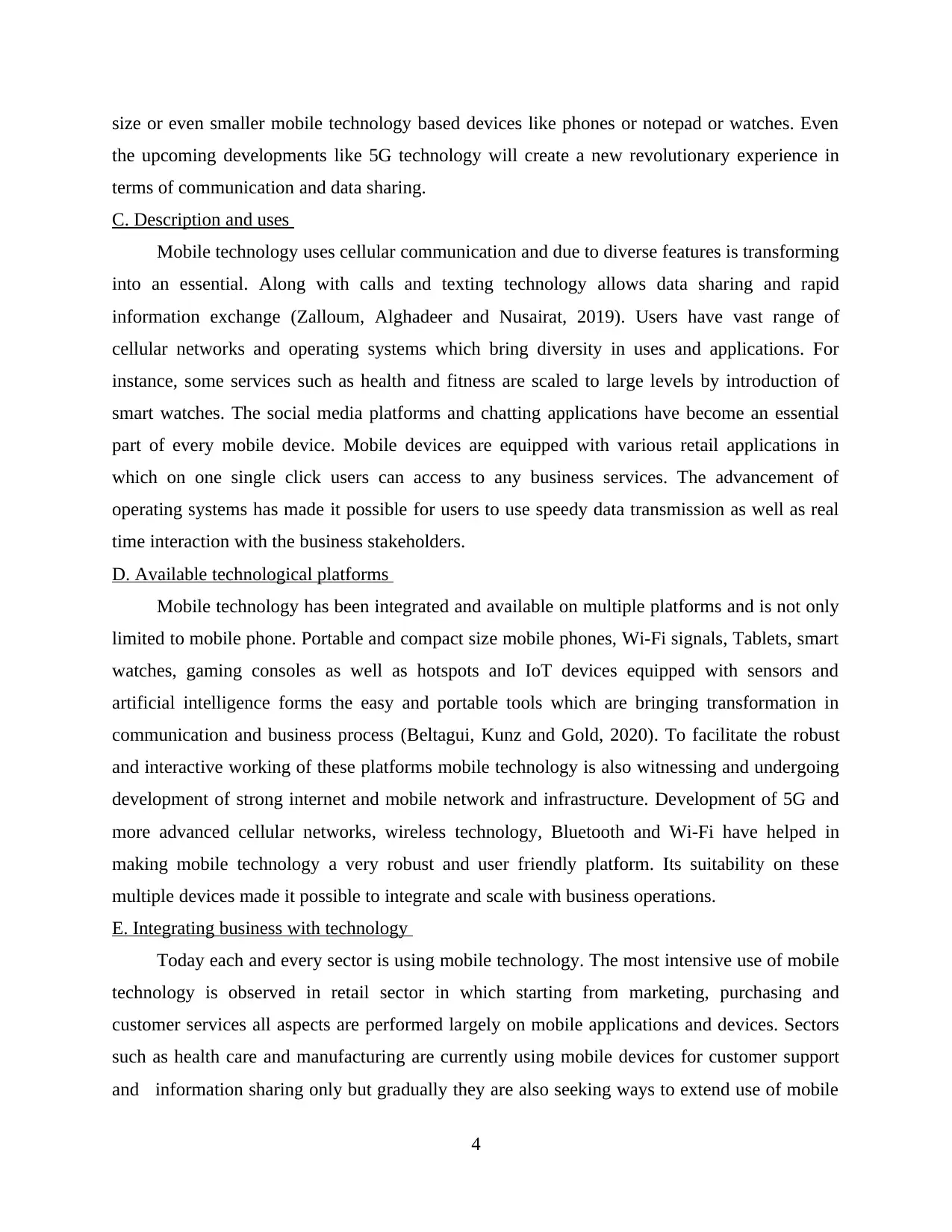
size or even smaller mobile technology based devices like phones or notepad or watches. Even
the upcoming developments like 5G technology will create a new revolutionary experience in
terms of communication and data sharing.
C. Description and uses
Mobile technology uses cellular communication and due to diverse features is transforming
into an essential. Along with calls and texting technology allows data sharing and rapid
information exchange (Zalloum, Alghadeer and Nusairat, 2019). Users have vast range of
cellular networks and operating systems which bring diversity in uses and applications. For
instance, some services such as health and fitness are scaled to large levels by introduction of
smart watches. The social media platforms and chatting applications have become an essential
part of every mobile device. Mobile devices are equipped with various retail applications in
which on one single click users can access to any business services. The advancement of
operating systems has made it possible for users to use speedy data transmission as well as real
time interaction with the business stakeholders.
D. Available technological platforms
Mobile technology has been integrated and available on multiple platforms and is not only
limited to mobile phone. Portable and compact size mobile phones, Wi-Fi signals, Tablets, smart
watches, gaming consoles as well as hotspots and IoT devices equipped with sensors and
artificial intelligence forms the easy and portable tools which are bringing transformation in
communication and business process (Beltagui, Kunz and Gold, 2020). To facilitate the robust
and interactive working of these platforms mobile technology is also witnessing and undergoing
development of strong internet and mobile network and infrastructure. Development of 5G and
more advanced cellular networks, wireless technology, Bluetooth and Wi-Fi have helped in
making mobile technology a very robust and user friendly platform. Its suitability on these
multiple devices made it possible to integrate and scale with business operations.
E. Integrating business with technology
Today each and every sector is using mobile technology. The most intensive use of mobile
technology is observed in retail sector in which starting from marketing, purchasing and
customer services all aspects are performed largely on mobile applications and devices. Sectors
such as health care and manufacturing are currently using mobile devices for customer support
and information sharing only but gradually they are also seeking ways to extend use of mobile
4
the upcoming developments like 5G technology will create a new revolutionary experience in
terms of communication and data sharing.
C. Description and uses
Mobile technology uses cellular communication and due to diverse features is transforming
into an essential. Along with calls and texting technology allows data sharing and rapid
information exchange (Zalloum, Alghadeer and Nusairat, 2019). Users have vast range of
cellular networks and operating systems which bring diversity in uses and applications. For
instance, some services such as health and fitness are scaled to large levels by introduction of
smart watches. The social media platforms and chatting applications have become an essential
part of every mobile device. Mobile devices are equipped with various retail applications in
which on one single click users can access to any business services. The advancement of
operating systems has made it possible for users to use speedy data transmission as well as real
time interaction with the business stakeholders.
D. Available technological platforms
Mobile technology has been integrated and available on multiple platforms and is not only
limited to mobile phone. Portable and compact size mobile phones, Wi-Fi signals, Tablets, smart
watches, gaming consoles as well as hotspots and IoT devices equipped with sensors and
artificial intelligence forms the easy and portable tools which are bringing transformation in
communication and business process (Beltagui, Kunz and Gold, 2020). To facilitate the robust
and interactive working of these platforms mobile technology is also witnessing and undergoing
development of strong internet and mobile network and infrastructure. Development of 5G and
more advanced cellular networks, wireless technology, Bluetooth and Wi-Fi have helped in
making mobile technology a very robust and user friendly platform. Its suitability on these
multiple devices made it possible to integrate and scale with business operations.
E. Integrating business with technology
Today each and every sector is using mobile technology. The most intensive use of mobile
technology is observed in retail sector in which starting from marketing, purchasing and
customer services all aspects are performed largely on mobile applications and devices. Sectors
such as health care and manufacturing are currently using mobile devices for customer support
and information sharing only but gradually they are also seeking ways to extend use of mobile
4
Paraphrase This Document
Need a fresh take? Get an instant paraphrase of this document with our AI Paraphraser
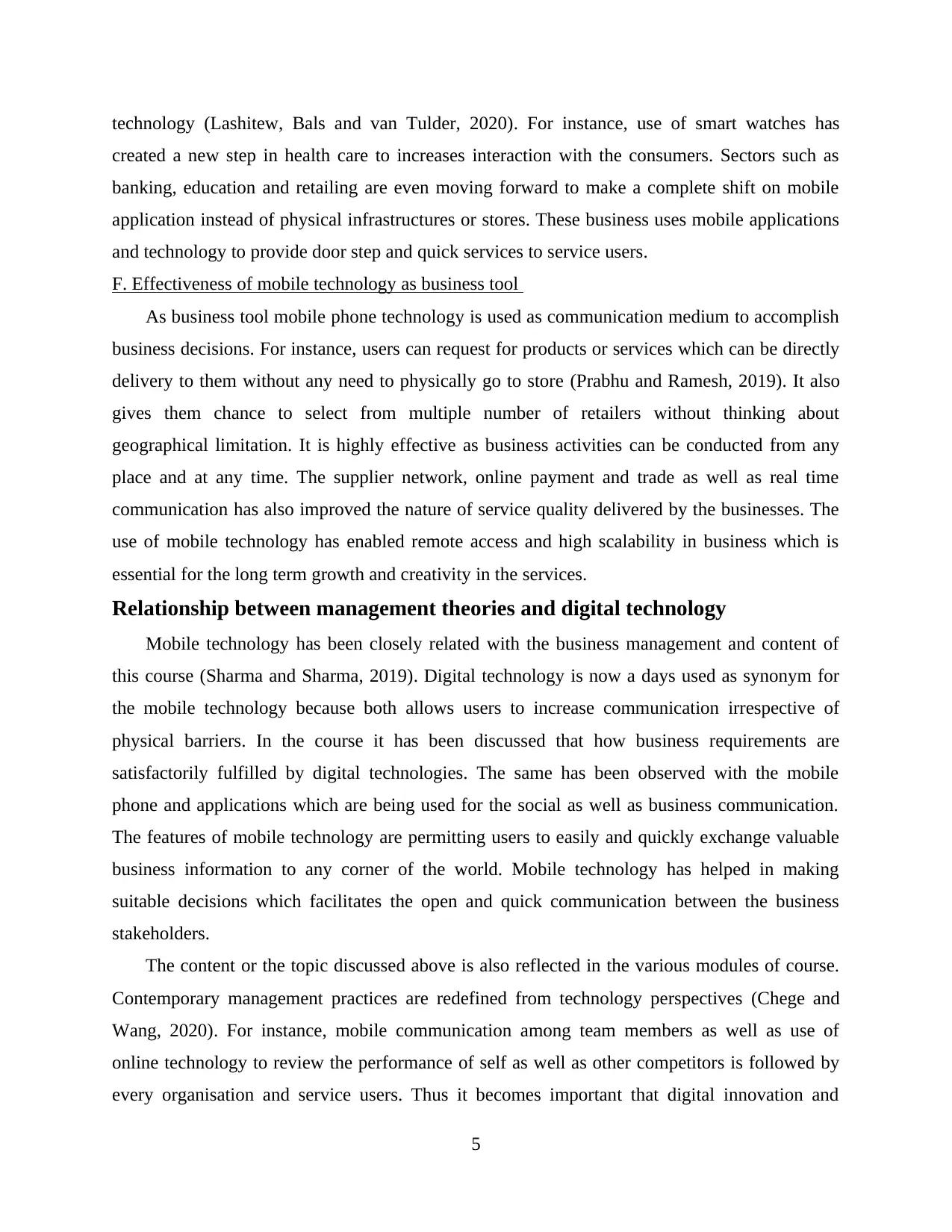
technology (Lashitew, Bals and van Tulder, 2020). For instance, use of smart watches has
created a new step in health care to increases interaction with the consumers. Sectors such as
banking, education and retailing are even moving forward to make a complete shift on mobile
application instead of physical infrastructures or stores. These business uses mobile applications
and technology to provide door step and quick services to service users.
F. Effectiveness of mobile technology as business tool
As business tool mobile phone technology is used as communication medium to accomplish
business decisions. For instance, users can request for products or services which can be directly
delivery to them without any need to physically go to store (Prabhu and Ramesh, 2019). It also
gives them chance to select from multiple number of retailers without thinking about
geographical limitation. It is highly effective as business activities can be conducted from any
place and at any time. The supplier network, online payment and trade as well as real time
communication has also improved the nature of service quality delivered by the businesses. The
use of mobile technology has enabled remote access and high scalability in business which is
essential for the long term growth and creativity in the services.
Relationship between management theories and digital technology
Mobile technology has been closely related with the business management and content of
this course (Sharma and Sharma, 2019). Digital technology is now a days used as synonym for
the mobile technology because both allows users to increase communication irrespective of
physical barriers. In the course it has been discussed that how business requirements are
satisfactorily fulfilled by digital technologies. The same has been observed with the mobile
phone and applications which are being used for the social as well as business communication.
The features of mobile technology are permitting users to easily and quickly exchange valuable
business information to any corner of the world. Mobile technology has helped in making
suitable decisions which facilitates the open and quick communication between the business
stakeholders.
The content or the topic discussed above is also reflected in the various modules of course.
Contemporary management practices are redefined from technology perspectives (Chege and
Wang, 2020). For instance, mobile communication among team members as well as use of
online technology to review the performance of self as well as other competitors is followed by
every organisation and service users. Thus it becomes important that digital innovation and
5
created a new step in health care to increases interaction with the consumers. Sectors such as
banking, education and retailing are even moving forward to make a complete shift on mobile
application instead of physical infrastructures or stores. These business uses mobile applications
and technology to provide door step and quick services to service users.
F. Effectiveness of mobile technology as business tool
As business tool mobile phone technology is used as communication medium to accomplish
business decisions. For instance, users can request for products or services which can be directly
delivery to them without any need to physically go to store (Prabhu and Ramesh, 2019). It also
gives them chance to select from multiple number of retailers without thinking about
geographical limitation. It is highly effective as business activities can be conducted from any
place and at any time. The supplier network, online payment and trade as well as real time
communication has also improved the nature of service quality delivered by the businesses. The
use of mobile technology has enabled remote access and high scalability in business which is
essential for the long term growth and creativity in the services.
Relationship between management theories and digital technology
Mobile technology has been closely related with the business management and content of
this course (Sharma and Sharma, 2019). Digital technology is now a days used as synonym for
the mobile technology because both allows users to increase communication irrespective of
physical barriers. In the course it has been discussed that how business requirements are
satisfactorily fulfilled by digital technologies. The same has been observed with the mobile
phone and applications which are being used for the social as well as business communication.
The features of mobile technology are permitting users to easily and quickly exchange valuable
business information to any corner of the world. Mobile technology has helped in making
suitable decisions which facilitates the open and quick communication between the business
stakeholders.
The content or the topic discussed above is also reflected in the various modules of course.
Contemporary management practices are redefined from technology perspectives (Chege and
Wang, 2020). For instance, mobile communication among team members as well as use of
online technology to review the performance of self as well as other competitors is followed by
every organisation and service users. Thus it becomes important that digital innovation and
5
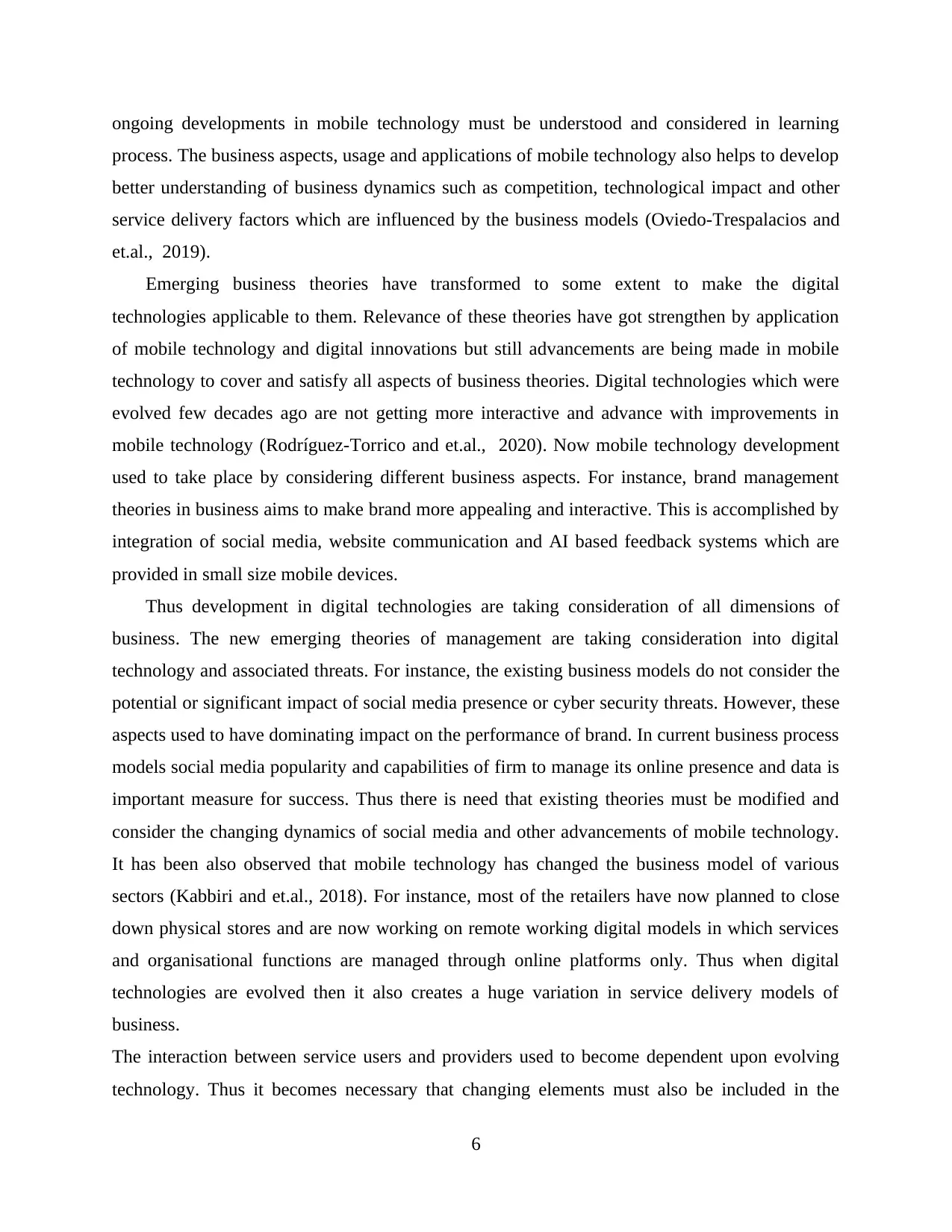
ongoing developments in mobile technology must be understood and considered in learning
process. The business aspects, usage and applications of mobile technology also helps to develop
better understanding of business dynamics such as competition, technological impact and other
service delivery factors which are influenced by the business models (Oviedo-Trespalacios and
et.al., 2019).
Emerging business theories have transformed to some extent to make the digital
technologies applicable to them. Relevance of these theories have got strengthen by application
of mobile technology and digital innovations but still advancements are being made in mobile
technology to cover and satisfy all aspects of business theories. Digital technologies which were
evolved few decades ago are not getting more interactive and advance with improvements in
mobile technology (Rodríguez-Torrico and et.al., 2020). Now mobile technology development
used to take place by considering different business aspects. For instance, brand management
theories in business aims to make brand more appealing and interactive. This is accomplished by
integration of social media, website communication and AI based feedback systems which are
provided in small size mobile devices.
Thus development in digital technologies are taking consideration of all dimensions of
business. The new emerging theories of management are taking consideration into digital
technology and associated threats. For instance, the existing business models do not consider the
potential or significant impact of social media presence or cyber security threats. However, these
aspects used to have dominating impact on the performance of brand. In current business process
models social media popularity and capabilities of firm to manage its online presence and data is
important measure for success. Thus there is need that existing theories must be modified and
consider the changing dynamics of social media and other advancements of mobile technology.
It has been also observed that mobile technology has changed the business model of various
sectors (Kabbiri and et.al., 2018). For instance, most of the retailers have now planned to close
down physical stores and are now working on remote working digital models in which services
and organisational functions are managed through online platforms only. Thus when digital
technologies are evolved then it also creates a huge variation in service delivery models of
business.
The interaction between service users and providers used to become dependent upon evolving
technology. Thus it becomes necessary that changing elements must also be included in the
6
process. The business aspects, usage and applications of mobile technology also helps to develop
better understanding of business dynamics such as competition, technological impact and other
service delivery factors which are influenced by the business models (Oviedo-Trespalacios and
et.al., 2019).
Emerging business theories have transformed to some extent to make the digital
technologies applicable to them. Relevance of these theories have got strengthen by application
of mobile technology and digital innovations but still advancements are being made in mobile
technology to cover and satisfy all aspects of business theories. Digital technologies which were
evolved few decades ago are not getting more interactive and advance with improvements in
mobile technology (Rodríguez-Torrico and et.al., 2020). Now mobile technology development
used to take place by considering different business aspects. For instance, brand management
theories in business aims to make brand more appealing and interactive. This is accomplished by
integration of social media, website communication and AI based feedback systems which are
provided in small size mobile devices.
Thus development in digital technologies are taking consideration of all dimensions of
business. The new emerging theories of management are taking consideration into digital
technology and associated threats. For instance, the existing business models do not consider the
potential or significant impact of social media presence or cyber security threats. However, these
aspects used to have dominating impact on the performance of brand. In current business process
models social media popularity and capabilities of firm to manage its online presence and data is
important measure for success. Thus there is need that existing theories must be modified and
consider the changing dynamics of social media and other advancements of mobile technology.
It has been also observed that mobile technology has changed the business model of various
sectors (Kabbiri and et.al., 2018). For instance, most of the retailers have now planned to close
down physical stores and are now working on remote working digital models in which services
and organisational functions are managed through online platforms only. Thus when digital
technologies are evolved then it also creates a huge variation in service delivery models of
business.
The interaction between service users and providers used to become dependent upon evolving
technology. Thus it becomes necessary that changing elements must also be included in the
6
⊘ This is a preview!⊘
Do you want full access?
Subscribe today to unlock all pages.

Trusted by 1+ million students worldwide
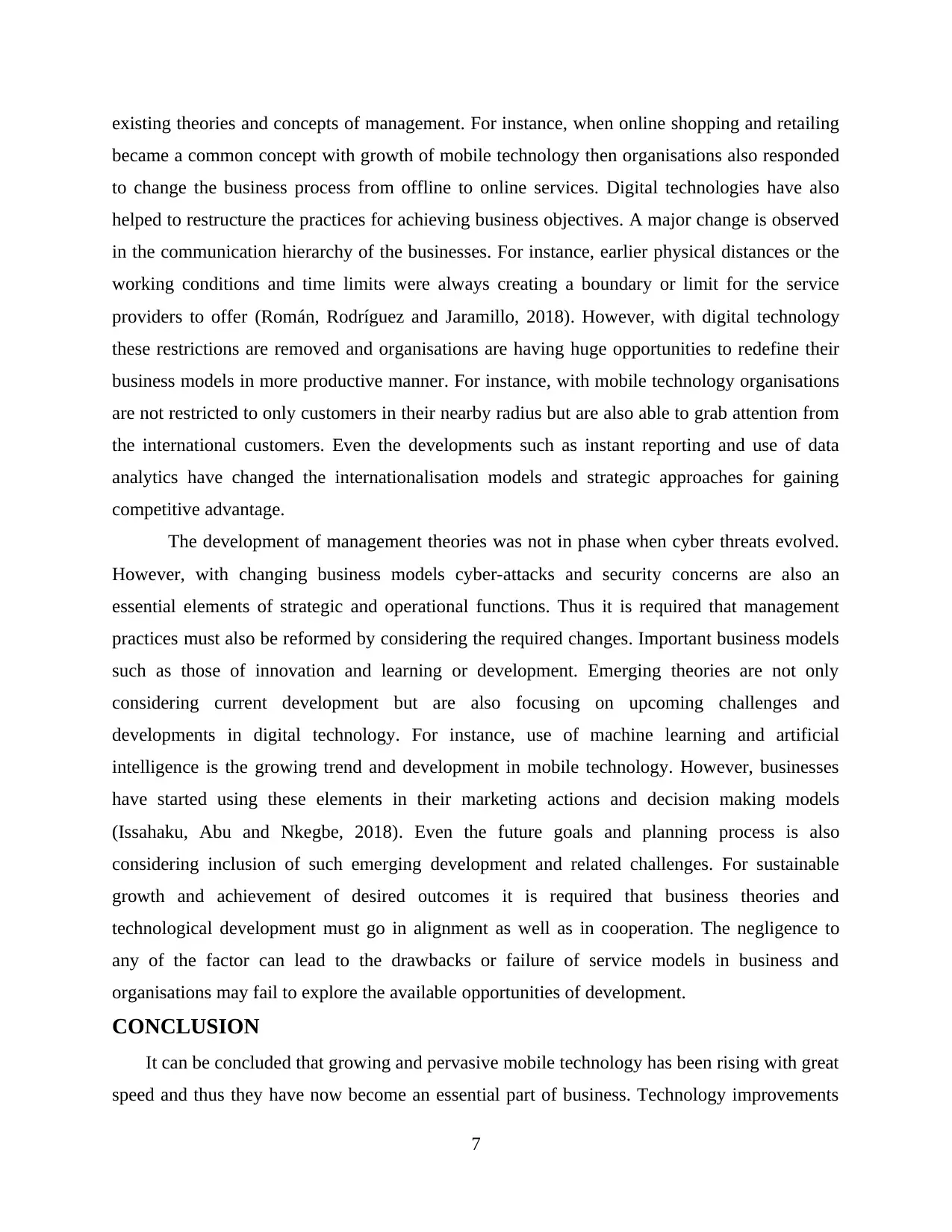
existing theories and concepts of management. For instance, when online shopping and retailing
became a common concept with growth of mobile technology then organisations also responded
to change the business process from offline to online services. Digital technologies have also
helped to restructure the practices for achieving business objectives. A major change is observed
in the communication hierarchy of the businesses. For instance, earlier physical distances or the
working conditions and time limits were always creating a boundary or limit for the service
providers to offer (Román, Rodríguez and Jaramillo, 2018). However, with digital technology
these restrictions are removed and organisations are having huge opportunities to redefine their
business models in more productive manner. For instance, with mobile technology organisations
are not restricted to only customers in their nearby radius but are also able to grab attention from
the international customers. Even the developments such as instant reporting and use of data
analytics have changed the internationalisation models and strategic approaches for gaining
competitive advantage.
The development of management theories was not in phase when cyber threats evolved.
However, with changing business models cyber-attacks and security concerns are also an
essential elements of strategic and operational functions. Thus it is required that management
practices must also be reformed by considering the required changes. Important business models
such as those of innovation and learning or development. Emerging theories are not only
considering current development but are also focusing on upcoming challenges and
developments in digital technology. For instance, use of machine learning and artificial
intelligence is the growing trend and development in mobile technology. However, businesses
have started using these elements in their marketing actions and decision making models
(Issahaku, Abu and Nkegbe, 2018). Even the future goals and planning process is also
considering inclusion of such emerging development and related challenges. For sustainable
growth and achievement of desired outcomes it is required that business theories and
technological development must go in alignment as well as in cooperation. The negligence to
any of the factor can lead to the drawbacks or failure of service models in business and
organisations may fail to explore the available opportunities of development.
CONCLUSION
It can be concluded that growing and pervasive mobile technology has been rising with great
speed and thus they have now become an essential part of business. Technology improvements
7
became a common concept with growth of mobile technology then organisations also responded
to change the business process from offline to online services. Digital technologies have also
helped to restructure the practices for achieving business objectives. A major change is observed
in the communication hierarchy of the businesses. For instance, earlier physical distances or the
working conditions and time limits were always creating a boundary or limit for the service
providers to offer (Román, Rodríguez and Jaramillo, 2018). However, with digital technology
these restrictions are removed and organisations are having huge opportunities to redefine their
business models in more productive manner. For instance, with mobile technology organisations
are not restricted to only customers in their nearby radius but are also able to grab attention from
the international customers. Even the developments such as instant reporting and use of data
analytics have changed the internationalisation models and strategic approaches for gaining
competitive advantage.
The development of management theories was not in phase when cyber threats evolved.
However, with changing business models cyber-attacks and security concerns are also an
essential elements of strategic and operational functions. Thus it is required that management
practices must also be reformed by considering the required changes. Important business models
such as those of innovation and learning or development. Emerging theories are not only
considering current development but are also focusing on upcoming challenges and
developments in digital technology. For instance, use of machine learning and artificial
intelligence is the growing trend and development in mobile technology. However, businesses
have started using these elements in their marketing actions and decision making models
(Issahaku, Abu and Nkegbe, 2018). Even the future goals and planning process is also
considering inclusion of such emerging development and related challenges. For sustainable
growth and achievement of desired outcomes it is required that business theories and
technological development must go in alignment as well as in cooperation. The negligence to
any of the factor can lead to the drawbacks or failure of service models in business and
organisations may fail to explore the available opportunities of development.
CONCLUSION
It can be concluded that growing and pervasive mobile technology has been rising with great
speed and thus they have now become an essential part of business. Technology improvements
7
Paraphrase This Document
Need a fresh take? Get an instant paraphrase of this document with our AI Paraphraser
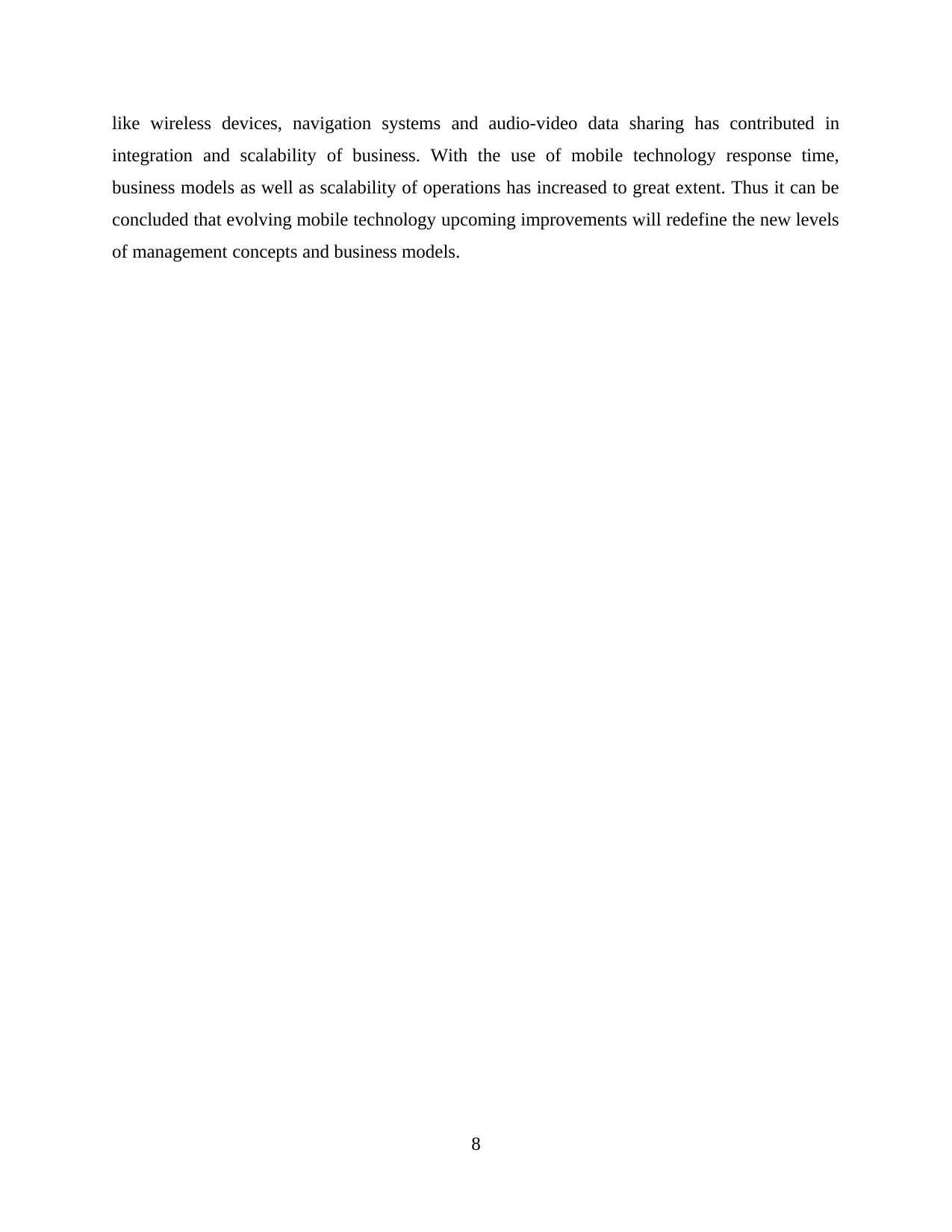
like wireless devices, navigation systems and audio-video data sharing has contributed in
integration and scalability of business. With the use of mobile technology response time,
business models as well as scalability of operations has increased to great extent. Thus it can be
concluded that evolving mobile technology upcoming improvements will redefine the new levels
of management concepts and business models.
8
integration and scalability of business. With the use of mobile technology response time,
business models as well as scalability of operations has increased to great extent. Thus it can be
concluded that evolving mobile technology upcoming improvements will redefine the new levels
of management concepts and business models.
8
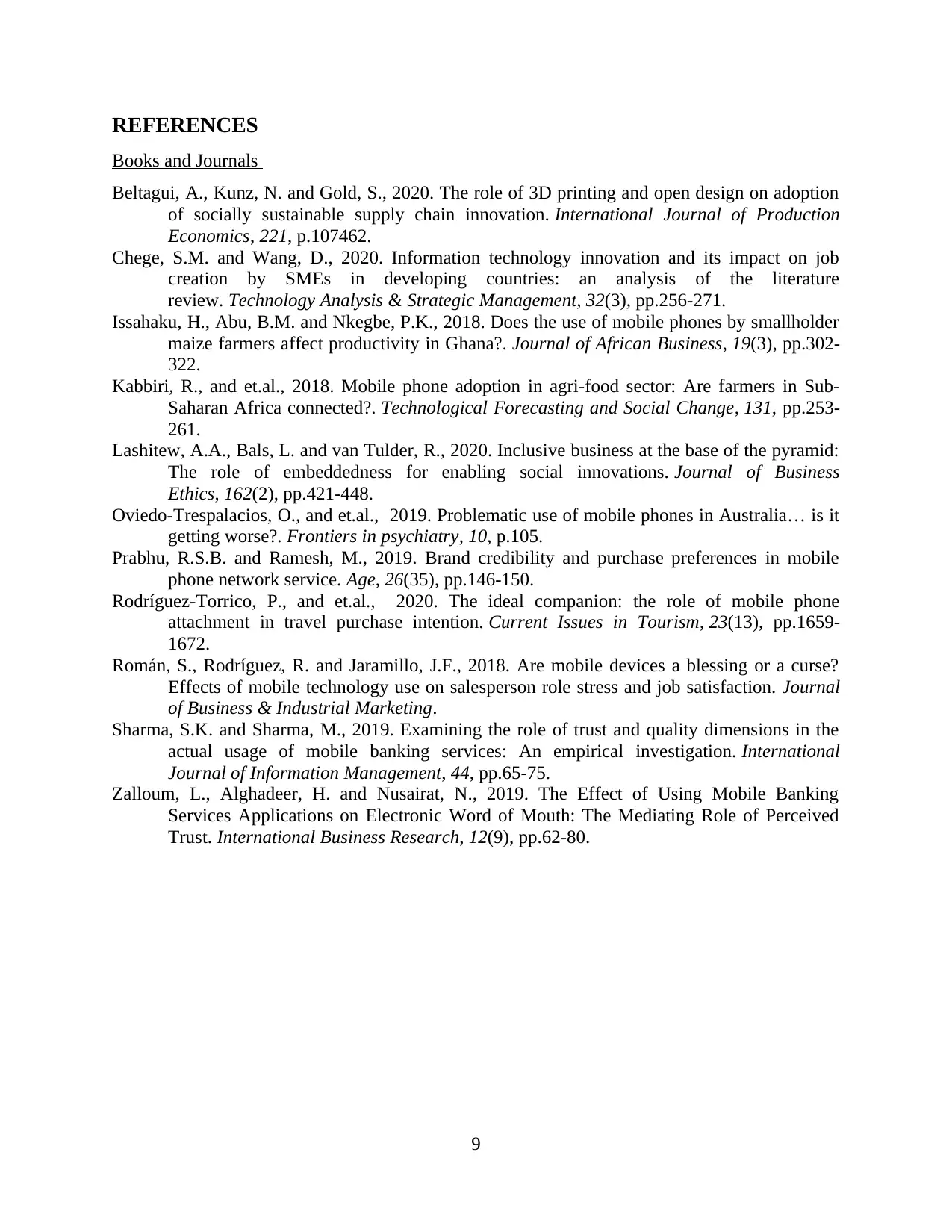
REFERENCES
Books and Journals
Beltagui, A., Kunz, N. and Gold, S., 2020. The role of 3D printing and open design on adoption
of socially sustainable supply chain innovation. International Journal of Production
Economics, 221, p.107462.
Chege, S.M. and Wang, D., 2020. Information technology innovation and its impact on job
creation by SMEs in developing countries: an analysis of the literature
review. Technology Analysis & Strategic Management, 32(3), pp.256-271.
Issahaku, H., Abu, B.M. and Nkegbe, P.K., 2018. Does the use of mobile phones by smallholder
maize farmers affect productivity in Ghana?. Journal of African Business, 19(3), pp.302-
322.
Kabbiri, R., and et.al., 2018. Mobile phone adoption in agri-food sector: Are farmers in Sub-
Saharan Africa connected?. Technological Forecasting and Social Change, 131, pp.253-
261.
Lashitew, A.A., Bals, L. and van Tulder, R., 2020. Inclusive business at the base of the pyramid:
The role of embeddedness for enabling social innovations. Journal of Business
Ethics, 162(2), pp.421-448.
Oviedo-Trespalacios, O., and et.al., 2019. Problematic use of mobile phones in Australia… is it
getting worse?. Frontiers in psychiatry, 10, p.105.
Prabhu, R.S.B. and Ramesh, M., 2019. Brand credibility and purchase preferences in mobile
phone network service. Age, 26(35), pp.146-150.
Rodríguez-Torrico, P., and et.al., 2020. The ideal companion: the role of mobile phone
attachment in travel purchase intention. Current Issues in Tourism, 23(13), pp.1659-
1672.
Román, S., Rodríguez, R. and Jaramillo, J.F., 2018. Are mobile devices a blessing or a curse?
Effects of mobile technology use on salesperson role stress and job satisfaction. Journal
of Business & Industrial Marketing.
Sharma, S.K. and Sharma, M., 2019. Examining the role of trust and quality dimensions in the
actual usage of mobile banking services: An empirical investigation. International
Journal of Information Management, 44, pp.65-75.
Zalloum, L., Alghadeer, H. and Nusairat, N., 2019. The Effect of Using Mobile Banking
Services Applications on Electronic Word of Mouth: The Mediating Role of Perceived
Trust. International Business Research, 12(9), pp.62-80.
9
Books and Journals
Beltagui, A., Kunz, N. and Gold, S., 2020. The role of 3D printing and open design on adoption
of socially sustainable supply chain innovation. International Journal of Production
Economics, 221, p.107462.
Chege, S.M. and Wang, D., 2020. Information technology innovation and its impact on job
creation by SMEs in developing countries: an analysis of the literature
review. Technology Analysis & Strategic Management, 32(3), pp.256-271.
Issahaku, H., Abu, B.M. and Nkegbe, P.K., 2018. Does the use of mobile phones by smallholder
maize farmers affect productivity in Ghana?. Journal of African Business, 19(3), pp.302-
322.
Kabbiri, R., and et.al., 2018. Mobile phone adoption in agri-food sector: Are farmers in Sub-
Saharan Africa connected?. Technological Forecasting and Social Change, 131, pp.253-
261.
Lashitew, A.A., Bals, L. and van Tulder, R., 2020. Inclusive business at the base of the pyramid:
The role of embeddedness for enabling social innovations. Journal of Business
Ethics, 162(2), pp.421-448.
Oviedo-Trespalacios, O., and et.al., 2019. Problematic use of mobile phones in Australia… is it
getting worse?. Frontiers in psychiatry, 10, p.105.
Prabhu, R.S.B. and Ramesh, M., 2019. Brand credibility and purchase preferences in mobile
phone network service. Age, 26(35), pp.146-150.
Rodríguez-Torrico, P., and et.al., 2020. The ideal companion: the role of mobile phone
attachment in travel purchase intention. Current Issues in Tourism, 23(13), pp.1659-
1672.
Román, S., Rodríguez, R. and Jaramillo, J.F., 2018. Are mobile devices a blessing or a curse?
Effects of mobile technology use on salesperson role stress and job satisfaction. Journal
of Business & Industrial Marketing.
Sharma, S.K. and Sharma, M., 2019. Examining the role of trust and quality dimensions in the
actual usage of mobile banking services: An empirical investigation. International
Journal of Information Management, 44, pp.65-75.
Zalloum, L., Alghadeer, H. and Nusairat, N., 2019. The Effect of Using Mobile Banking
Services Applications on Electronic Word of Mouth: The Mediating Role of Perceived
Trust. International Business Research, 12(9), pp.62-80.
9
⊘ This is a preview!⊘
Do you want full access?
Subscribe today to unlock all pages.

Trusted by 1+ million students worldwide
1 out of 9
Related Documents
Your All-in-One AI-Powered Toolkit for Academic Success.
+13062052269
info@desklib.com
Available 24*7 on WhatsApp / Email
![[object Object]](/_next/static/media/star-bottom.7253800d.svg)
Unlock your academic potential
Copyright © 2020–2026 A2Z Services. All Rights Reserved. Developed and managed by ZUCOL.





